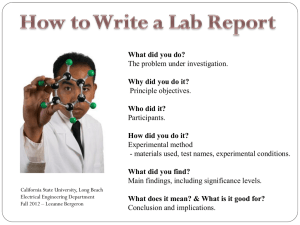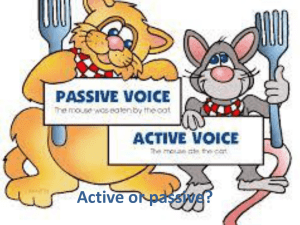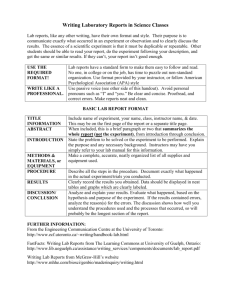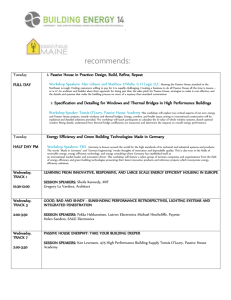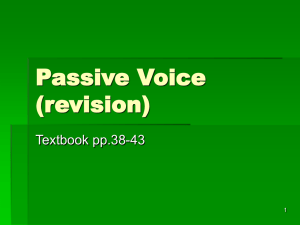Passive Voice
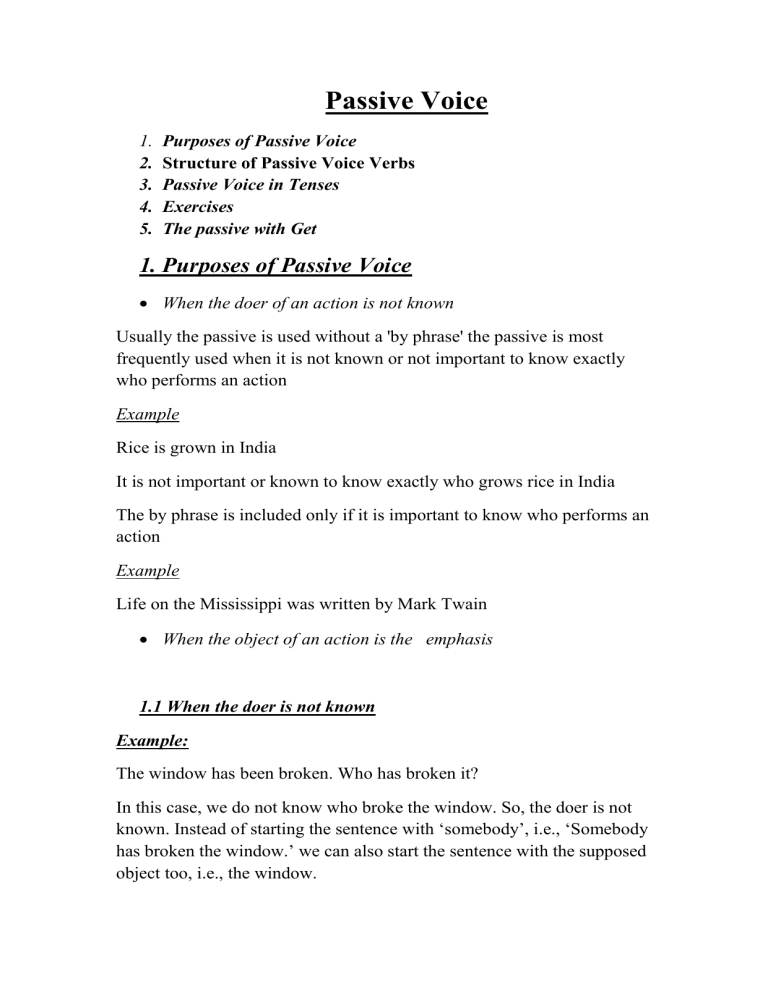
Passive Voice
1.
Purposes of Passive Voice
2.
Structure of Passive Voice Verbs
3.
Passive Voice in Tenses
4.
Exercises
5.
The passive with Get
1. Purposes of Passive Voice
When the doer of an action is not known
Usually the passive is used without a 'by phrase' the passive is most frequently used when it is not known or not important to know exactly who performs an action
Example
Rice is grown in India
It is not important or known to know exactly who grows rice in India
The by phrase is included only if it is important to know who performs an action
Example
Life on the Mississippi was written by Mark Twain
When the object of an action is the emphasis
1.1 When the doer is not known
Example:
The window has been broken. Who has broken it?
In this case, we do not know who broke the window. So, the doer is not known. Instead of starting the sentence with ‘somebody’, i.e., ‘Somebody has broken the window.’ we can also start the sentence with the supposed object too, i.e., the window.
1.2 When the object of the action is the emphasis
Example:
This murderous killer was sentenced a life’s imprisonment.
In this case, we do not care about who made the judgment. Instead, our emphasis is put on the murderous killer. So, we start the sentence with
‘the killer’ in order to stand out our focus concerned.
2. Structure of Passive Voice Verbs
Syntactic Structure
Active ----------------------- Passive e.g. Eats ----------------------- is eaten i.e. Verb ----------------------- Be+p.p.
To explain, in a passive verb phrase, the structure is
‘Be+p.p.’, in which, ‘be’ is changed according to its tense and number.
3. Passive Voice in Tenses
3.1 Present Tenses
By using the verb ‘eat’,
Tenses Active passive
Simple present eats is eaten
Present progressive is eating is being eaten
Present perfect has eaten has been eaten
Present perfect progressive has been eating has been being eaten
Note: In passive verb phrases, the last word is always in p.p. form.
1 | P a g e
3. Passive Voice in Tenses
3.2 Past Tenses
By using the verb ‘eat’,
Was eaten
Active Passive Tense
Ate Simple past
Continuous was eating was being eaten
Perfect had eaten had been eaten
3.3 Future Tense
By using the verb ‘eat’,
Tense Active
Future - Simple
Passive
-will eat will be eaten
- continuous -will be eating will be being eaten
- perfect -will have eaten will have been eaten
- perfect continuous-will have been eating NIL
Modals
The passive form
Modal + be + past participle
Example
Tom will be invited to the picnic
The window can't be opened
This book had better to returned to the library before Friday
2 | P a g e
Exercises (1)
1. The entire valley ---------------- from the mountain (can see)
2. A child -------------------everything he or she wants
(should+give+not)
3. Meat ------------------- in a refrigerator or it will spoil (must + keep)
4. These books -----------------to the library (have to return)
5. Whales ------------------- from extinction (must + save)
Example: (GENERAL)
People speak English in many countries
Compare: English is spoken in many countries.
Somebody/They pulled down the building last week.
Compare: The old building was pulled down (by then/somebody) last week.
We will hold a meeting tomorrow.
Compare: A meeting will be held tomorrow (by us).
* ( ) means optional.
Exercise (2)
1. Somebody cleans our classroom every day.
2. Japan exported millions of cars last year.
3. Mr. Chan will feed his dog on canned food.
4. Alex is preparing that report
5. Waitresses and waiters serve customers
6. Shirley has suggested a new idea
7. Two horses were pulling the farmers wagon
3 | P a g e
PASSIVE WITH GET
1. Get may be followed by adjectives
Examples
You shouldn’t eat so much you will get fat
I stop working because I got sleepy
2. Get may also be followed by past participles the past participles functions as an adjective (it describes the subject)
Examples
I stop working because I got tired
I got worried because he was two hours late
Exercise (3)
Use GET in your answer
1. There was an accident but nobody----------- (hurt)
2. We didn’t have a map so we------------ (lose)
3. We can leave as soon as you----------- (dress)
4. Chris ----------- when she lost her job (depress)
5. Just try to take it easy don’t--------- (upset)
4 | P a g e
Answer Key
Exercise (1)
1. Can be seen
2. Shouldnt be given
3. Must be kept
4. Have to be returned
5. Must be saved
Exercise (2)
1. Our classroom is cleaned
2. Milions of cars were exported
3. His dog will be fed
4. That report is being prepared
5. Customers are served
6. A new idea has been suggested
7. The farmer's wagon was being pulled
Exercise (3)
1. Got hurt
2. got lost
3. get dressed
4. Got depressed
5. get upset
5 | P a g e
